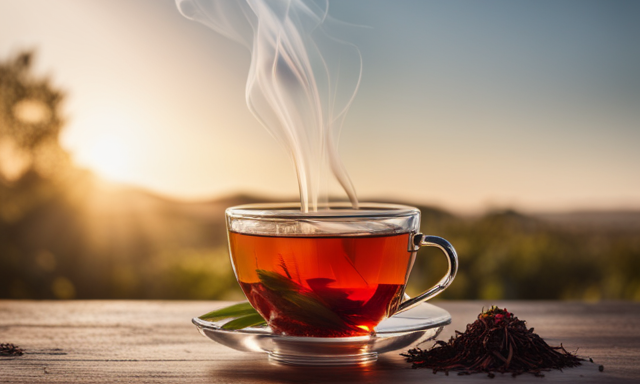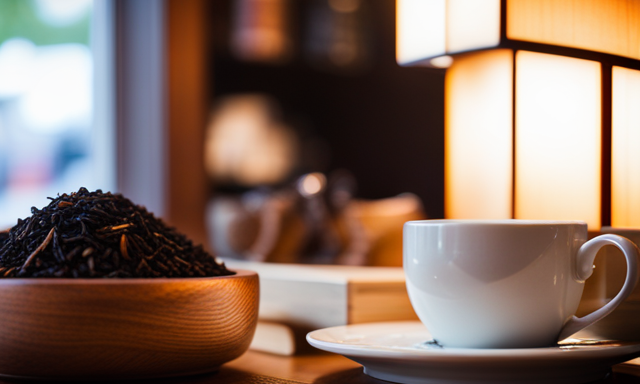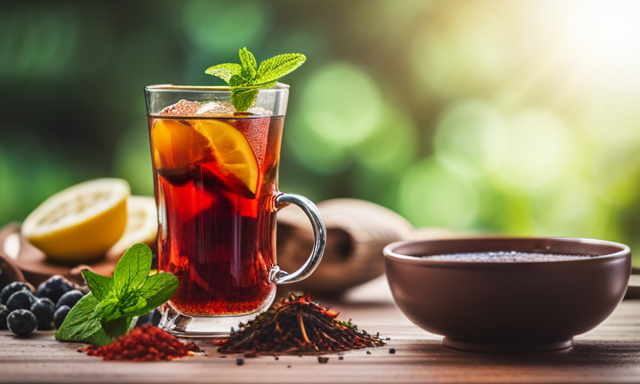As I sit here, sipping a warm cup of rooibos tea, I can’t help but be captivated by the intricate dance of flavors and aromas that envelop my senses.
Each sip transports me to the sun-kissed lands of South Africa, where this remarkable beverage originates. Rooibos tea, derived from the leaves of the Aspalathus linearis plant, has a rich history steeped in tradition and cultural significance.
But what truly sets it apart are the constituents that make it a true elixir of wellness. Bursting with antioxidants, minerals, and nutrients, rooibos tea offers a myriad of health benefits. Its polyphenols and flavonoids provide a powerful defense against oxidative stress, while its caffeine-free and low tannin content make it a soothing and calming choice.
With its various varieties and flavors, rooibos tea is not just a drink, but a delightful companion that can be incorporated seamlessly into your daily routine.
So join me on this journey as we explore the captivating constituents of rooibos tea and unlock its secrets together.
Key Takeaways
- Rooibos tea is derived from the leaves of the Aspalathus linearis plant and undergoes a careful harvesting and processing process.
- It is rich in antioxidants, minerals, and nutrients, including unique polyphenols like aspalathin and nothofagin.
- Rooibos tea offers a variety of health benefits, such as fighting free radicals, improving blood circulation, promoting digestion, and calming the nervous system.
- Enjoying rooibos tea can be a refreshing and delightful experience that supports overall wellness.
History and Origins of Rooibos Tea
So, you’re probably wondering where this magical tea called rooibos comes from. Well, let me take you on a journey through the history and origins of this delightful beverage.
Rooibos tea, also known as red bush tea, has its roots in the Cederberg region of South Africa. The indigenous Khoi-San people first discovered the wild rooibos plant and began using its leaves to brew a flavorful tea centuries ago. It wasn’t until the 1900s that rooibos tea gained popularity beyond the local communities.
Today, it’s enjoyed worldwide for its unique taste and numerous health benefits. Now that you have a glimpse into the fascinating history of rooibos tea, let’s explore the rooibos plant and harvesting process.
The Rooibos Plant and Harvesting Process
During the harvesting process, the Rooibos plant is carefully picked and processed to create a refreshing and aromatic infusion.
Rooibos tea cultivation begins with the planting of the seeds in nutrient-rich soil. The plant takes about 18 months to grow before it can be harvested.
Once matured, the leaves and stems are expertly plucked by hand, ensuring only the finest quality parts are selected.
After harvesting, the leaves and stems undergo an oxidation process, where they are spread out in the sun to dry. This step is crucial in bringing out the unique flavors and deep red color of the tea.
Finally, the dried leaves and stems are carefully cut and sifted to create the loose leaf tea that we enjoy.
With the rooibos tea production complete, we can now move on to explore the abundant antioxidants in rooibos tea.
Antioxidants in Rooibos Tea
Rich in antioxidants, Rooibos tea offers a multitude of health benefits, protecting the body against oxidative stress and promoting overall well-being. The antioxidant properties in Rooibos tea come from its high content of polyphenols, which are known for their ability to fight free radicals and reduce inflammation. These polyphenols include aspalathin and nothofagin, unique to the Rooibos plant. Studies have shown that these antioxidants can help improve heart health, support the immune system, and even have anti-cancer effects. Additionally, Rooibos tea is caffeine-free and low in tannins, making it a gentle and soothing beverage that can be enjoyed throughout the day. Transitioning to the next section, minerals and nutrients found in Rooibos tea also contribute to its overall health benefits.
Minerals and Nutrients Found in Rooibos Tea
Packed with essential minerals and nutrients, Rooibos tea nourishes your body and leaves you feeling revitalized. This delicious tea contains a wealth of health benefits. Firstly, it’s rich in iron, which is essential for the production of red blood cells and the prevention of anemia.
Furthermore, Rooibos tea is a great source of calcium, promoting strong bones and teeth. It also contains magnesium, which helps regulate blood pressure and supports a healthy immune system. Additionally, this tea is bursting with antioxidants, such as vitamin C and zinc, which boost your immune system and protect your cells from damage.
These minerals and nutrients work together to improve overall health and well-being. As we move on to the next section on polyphenols and flavonoids in Rooibos tea, you’ll discover even more reasons to incorporate this amazing beverage into your daily routine.
Polyphenols and Flavonoids in Rooibos Tea
Indulge in the delightful benefits of the polyphenols and flavonoids found in this incredible South African herbal infusion. Rooibos tea is packed with these powerful compounds that contribute to its numerous health benefits.
Polyphenols, known for their antioxidant properties, help protect the body against free radicals and reduce inflammation. They’ve been linked to a lower risk of heart disease, cancer, and neurodegenerative diseases.
Flavonoids, on the other hand, play a crucial role in preventing chronic diseases by improving blood circulation, reducing blood pressure, and enhancing immune function.
Together, these compounds work synergistically to promote overall health and well-being.
Transitioning into the next section, let’s explore the potential health benefits of rooibos tea and how it can improve our daily lives.
Potential Health Benefits of Rooibos Tea
Discover the potential health benefits waiting for you when you incorporate this amazing South African herbal infusion into your daily routine.
-
Potential anti-inflammatory effects: Rooibos tea contains polyphenols and flavonoids that’ve been shown to have anti-inflammatory properties, which may help reduce inflammation in the body.
-
Potential anti-cancer properties: Some studies suggest that the antioxidants found in rooibos tea may have the ability to inhibit the growth of cancer cells, although more research is needed to fully understand this potential benefit.
-
Boosts immune system: The antioxidants in rooibos tea may help strengthen the immune system, making it more effective at fighting off infections and diseases.
-
Supports heart health: Rooibos tea is rich in antioxidants that can help protect against heart disease by reducing oxidative stress and inflammation in the body.
-
Promotes digestion: Drinking rooibos tea can help soothe the digestive system and relieve various gastrointestinal issues, such as indigestion and stomach cramps.
With its caffeine-free and low tannin content, rooibos tea offers a refreshing alternative to traditional teas without sacrificing taste or potential health benefits.
Caffeine-Free and Low Tannin Content
As I mentioned earlier, one of the potential health benefits of rooibos tea is that it’s caffeine-free. This makes it a great alternative for those who want to enjoy a warm beverage without the stimulating effects of caffeine.
Additionally, rooibos tea has a low tannin content, which sets it apart from other traditional teas. Tannins are naturally occurring compounds that can be found in many types of tea and can sometimes cause digestive issues or interfere with nutrient absorption. With rooibos tea, you can enjoy a soothing cup without worrying about tannin-related concerns.
Now, let’s dive into the next section and explore how rooibos tea can be a relaxing and stress-relieving beverage.
Rooibos Tea as a Relaxing and Stress-Relieving Beverage
Unwind with a cup of this soothing elixir, and let the troubles of the day melt away like a sunset over calm waters. Rooibos tea isn’t just caffeine-free and low in tannin, but it’s also known for its remarkable ability to promote relaxation and relieve stress.
This natural wonder contains a unique blend of antioxidants, such as aspalathin, that’ve been shown to have calming effects on the nervous system. Many people find solace in sipping on a warm cup of rooibos tea as part of their relaxation techniques or stress management routines.
Its gentle, earthy flavor and comforting aroma create a serene experience that helps melt away tension and promote a sense of tranquility.
Now, let’s dive into the world of different varieties and flavors of rooibos tea, and discover the endless possibilities this remarkable beverage has to offer.
Different Varieties and Flavors of Rooibos Tea
After exploring the relaxing and stress-relieving properties of Rooibos tea, let’s delve into the diverse world of its flavors and varieties. Rooibos tea comes in various blends and combinations, each offering a unique taste and experience. Whether you prefer the classic plain Rooibos or like to experiment with exciting flavors like vanilla, honeybush, or citrus, there is a Rooibos tea for every palate. Additionally, different brewing methods allow for customization, whether you enjoy a hot cup of tea or prefer it chilled over ice. Not only does Rooibos tea offer a delightful drinking experience, but it also provides numerous health benefits, including its antioxidant properties and potential immune-boosting effects. So, why not incorporate this versatile beverage into your daily routine, starting with exploring different flavors and brewing methods?
Incorporating Rooibos Tea into Your Daily Routine
To seamlessly integrate the rich flavors and potential health benefits of Rooibos tea into your daily regimen, consider incorporating it into your morning routine or enjoying a cup during your afternoon break.
Rooibos tea can be a great addition to your skincare routine, thanks to its antioxidant properties that help fight against free radicals and promote healthy skin. You can use it as a toner or mix it with other natural ingredients to create a soothing face mask.
Additionally, Rooibos tea has been used as a natural remedy for digestive issues. Its anti-inflammatory properties can help alleviate symptoms like bloating and indigestion. Sipping on a warm cup of Rooibos tea after a meal can provide relief and aid in digestion.
With its versatility and potential health benefits, incorporating Rooibos tea into your daily routine is a simple and enjoyable way to enhance your overall well-being.
Frequently Asked Questions
Are there any side effects or potential risks associated with drinking rooibos tea?
Drinking rooibos tea has no known side effects or risks. It is a safe and healthy beverage that can be enjoyed without any concerns. So go ahead and sip away!
Can rooibos tea help with weight loss or managing diabetes?
Rooibos tea can aid in weight loss due to its low calorie content and potential metabolism-boosting effects. Additionally, it may help manage diabetes by improving blood sugar control and insulin sensitivity.
Is rooibos tea safe for children and pregnant women?
Rooibos tea is generally safe for children and pregnant women, but it’s important to take safety precautions. It offers numerous health benefits, such as antioxidant properties and potential improvement in heart health.
Does rooibos tea interact with any medications or supplements?
Rooibos tea may interact with certain prescription drugs, so it’s important to consult with a healthcare professional. It may also affect nutrient absorption, so it’s best to consume it in moderation.
How does the taste of rooibos tea compare to other types of tea?
Compared to other types of tea, rooibos tea has a unique taste that is naturally sweet and slightly nutty. It offers numerous health benefits, including being caffeine-free, rich in antioxidants, and promoting digestion and skin health.
Conclusion
In conclusion, after exploring the constituents of rooibos tea, it’s clear that this beverage isn’t just delicious but also packed with health benefits. With its abundance of antioxidants, minerals, and polyphenols, rooibos tea can contribute to overall well-being.
Interestingly, studies have shown that rooibos tea doesn’t contain caffeine and has low tannin content, making it a perfect choice for those seeking a caffeine-free alternative.
So, why not incorporate this relaxing and stress-relieving beverage into your daily routine? It’s a wise choice for a healthier lifestyle.










